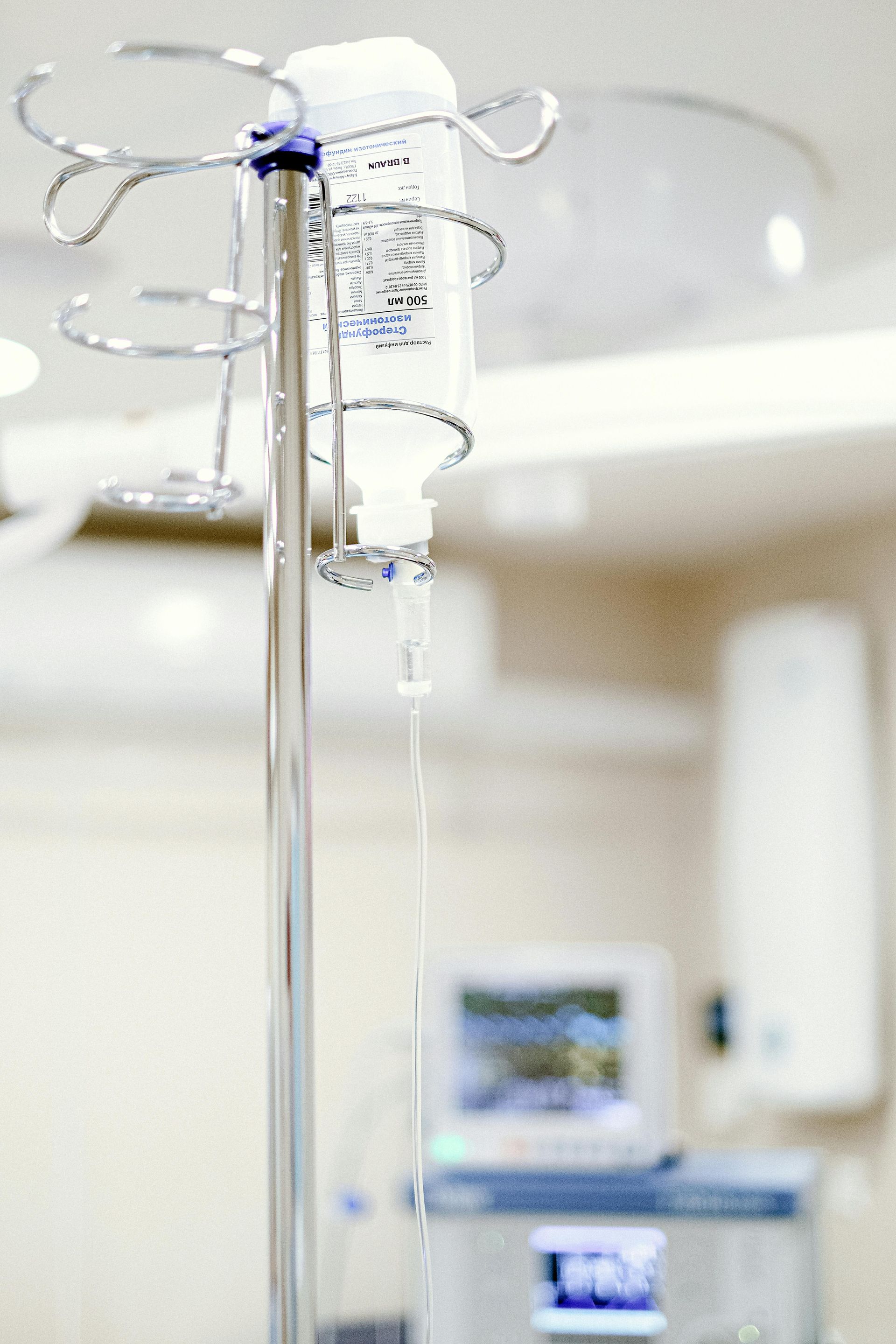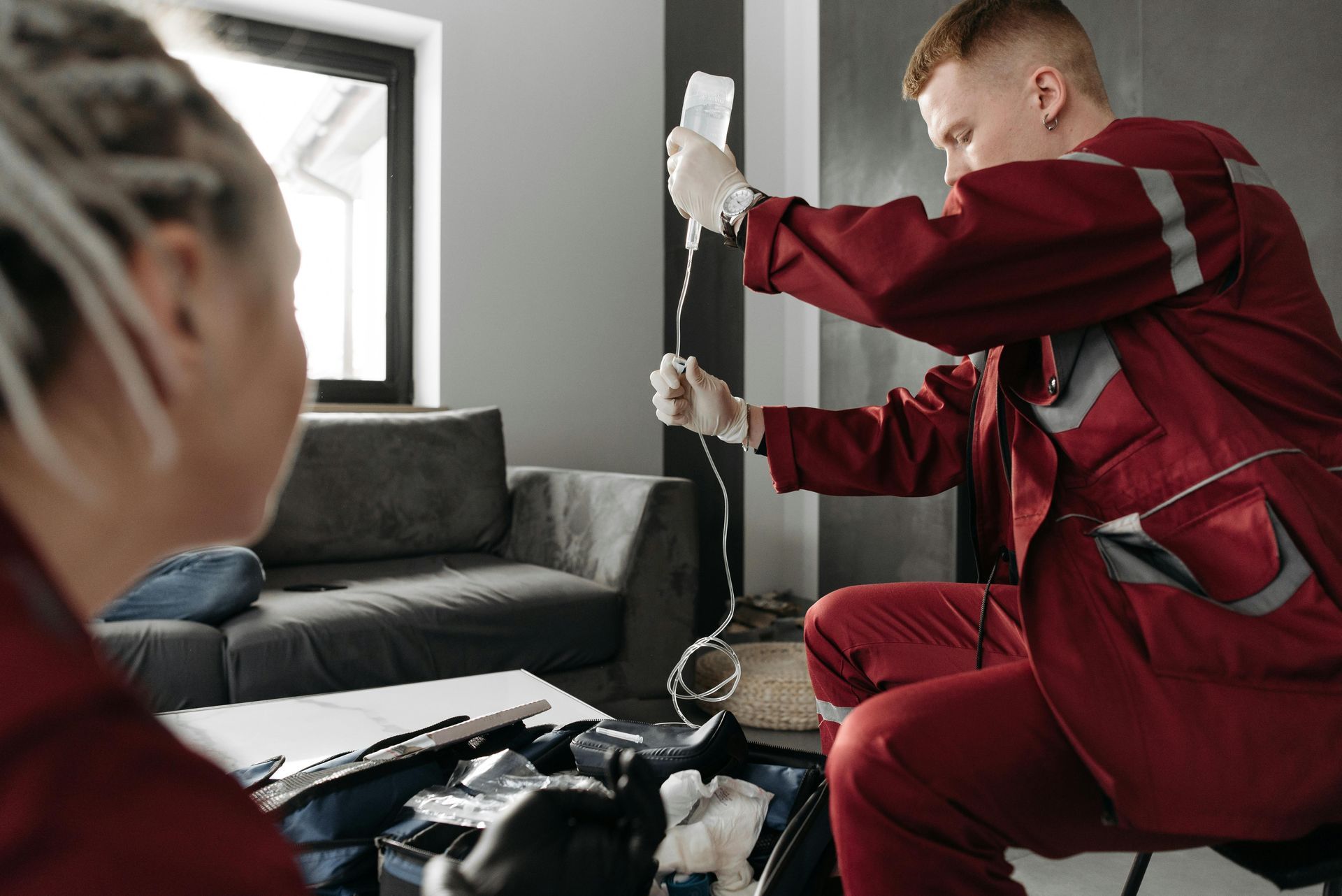Unlock Your Hydration Potential: Simple Ways to Drink More Water

Medically reviewed by Micaela Strevay, FNP-C, PMHNP-BC
Table of Contents
Learning how to drink water to hydrate effectively is one of the simplest yet most powerful things you can do for your health. Your body depends on water for every cellular function, from maintaining energy levels to keeping your brain sharp.
Quick Answer: How to Drink Water to Hydrate Effectively
- Sip consistently throughout the day rather than chugging large amounts
- Start your morning with 16-20 ounces of water upon waking
- Aim for half your body weight in ounces daily (150 lbs = 75 ounces)
- Add electrolytes during intense exercise or hot weather
- Monitor your urine color - pale yellow indicates good hydration
- Eat water-rich foods like watermelon, cucumbers, and oranges
The research is clear: water makes up 50-70% of your body weight and is crucial for temperature regulation, nutrient transport, and waste removal. Yet many people struggle with consistent hydration, leading to fatigue, headaches, and decreased performance.
For busy Arizona professionals in our desert climate, proper hydration is even more critical. The combination of high temperatures and low humidity creates unique challenges that require strategic fluid intake.
As a hydration specialist, I've helped countless Arizona residents overcome dehydration through education and advanced hydration therapies. My experience shows that understanding how to drink water to hydrate effectively can dramatically improve energy, focus, and overall wellness.
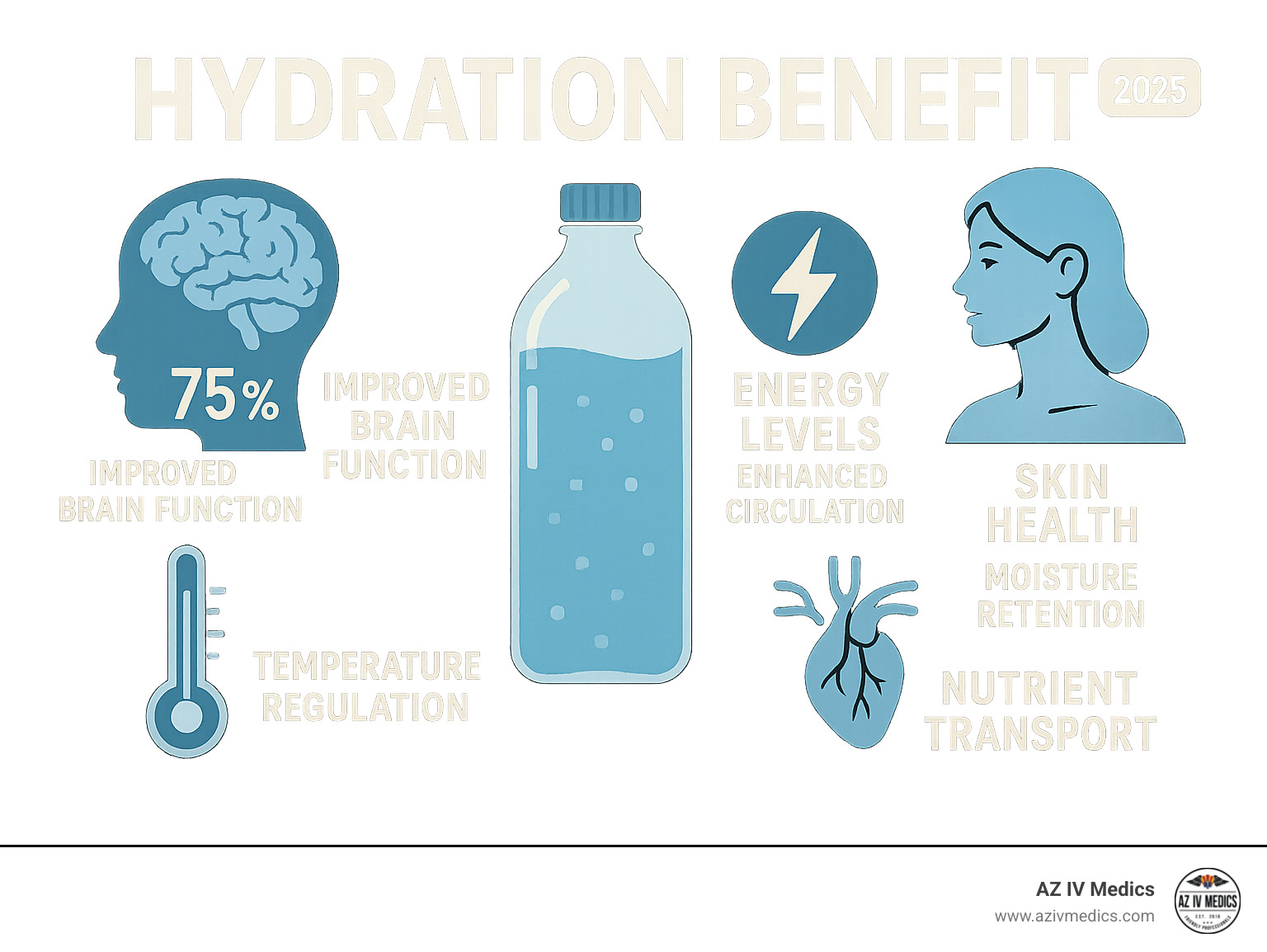
Why Proper Hydration is Your Health's Best Friend
Water is your body's most essential element, keeping everything running behind the scenes. While we often focus on vitamins and superfoods, we sometimes overlook this fundamental need.
Your body is 50-70% water , which explains why even mild dehydration can make you feel completely off your game. Water is constantly working in several key ways:
- Temperature regulation: This is one of water's most crucial jobs, especially in Arizona's brutal summers. Your body cools itself by sweating, but without adequate hydration, this built-in cooling system can't keep up.
- Nutrient transport: Water is your internal delivery service, carrying vitamins, minerals, and oxygen through your bloodstream. When you're well-hydrated, this system runs smoothly.
- Waste removal: Your kidneys need plenty of water to filter toxins and waste from your blood effectively. Water helps regulate body temperature, lubricate joints, transport nutrients, remove waste, and circulate blood , making it essential for every major bodily function.
- Joint lubrication: The fluid in your joints reduces friction and keeps everything moving smoothly. Dehydration can decrease this natural lubrication, leading to stiffness and discomfort.
Understanding how to drink water to hydrate is vital because dehydration doesn't just make you thirsty—it can drain your energy, cloud your thinking, and leave you feeling exhausted.
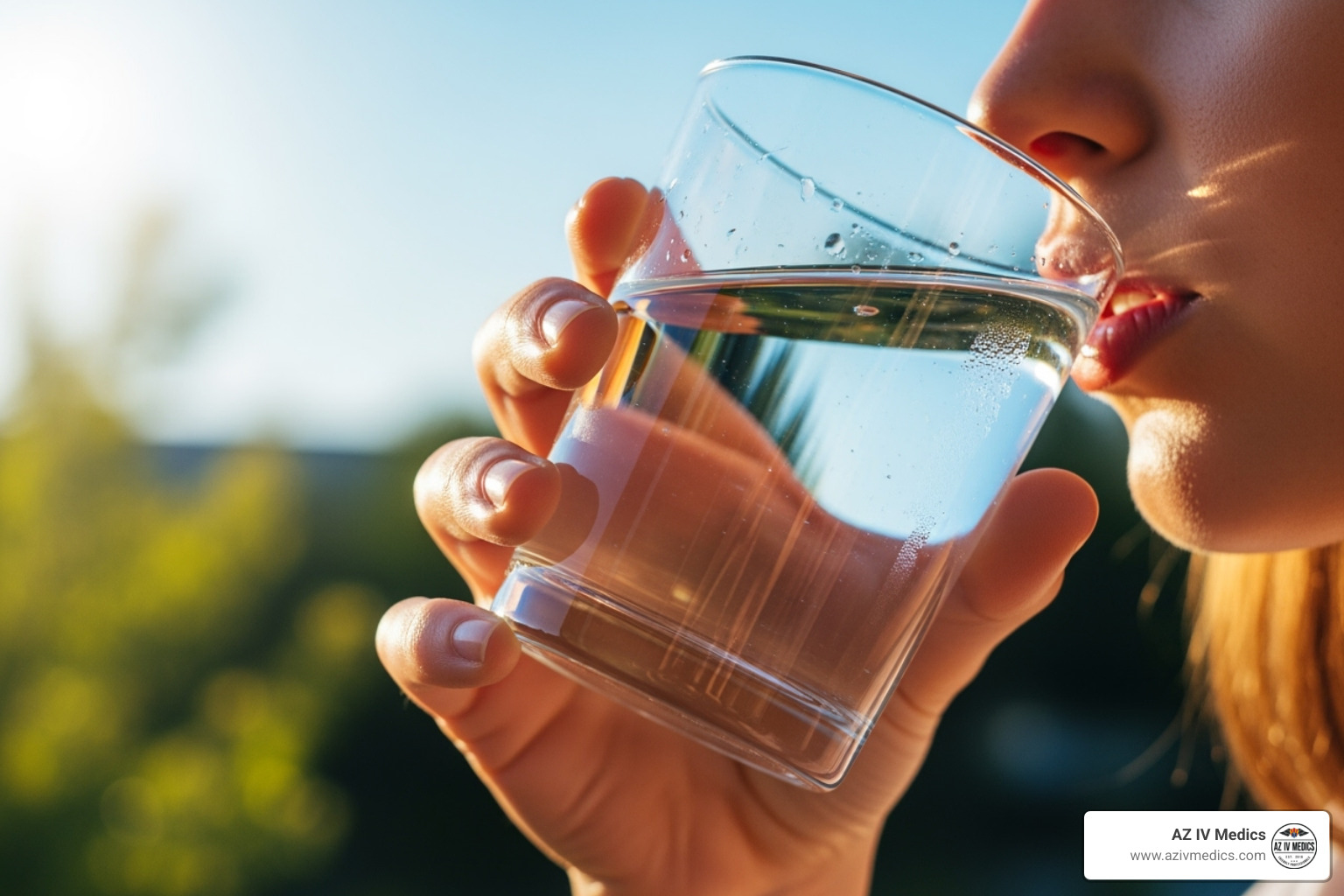
How Much Water Should You Really Drink?
A common question is how much water to drink. The classic "eight glasses a day" advice is a guideline, not a universal rule. Your daily water needs are highly individual. The U.S. National Academies of Sciences, Engineering, and Medicine provides a more comprehensive recommendation for adequate daily fluid intake:
- For men: About 15.5 cups (3.7 liters) of fluids a day.
- For women: About 11.5 cups (2.7 liters) of fluids a day.
These recommendations cover total fluid intake from all sources. About 20% of your daily fluid intake typically comes from the foods you eat , like watermelon or cucumber, with the rest from beverages.
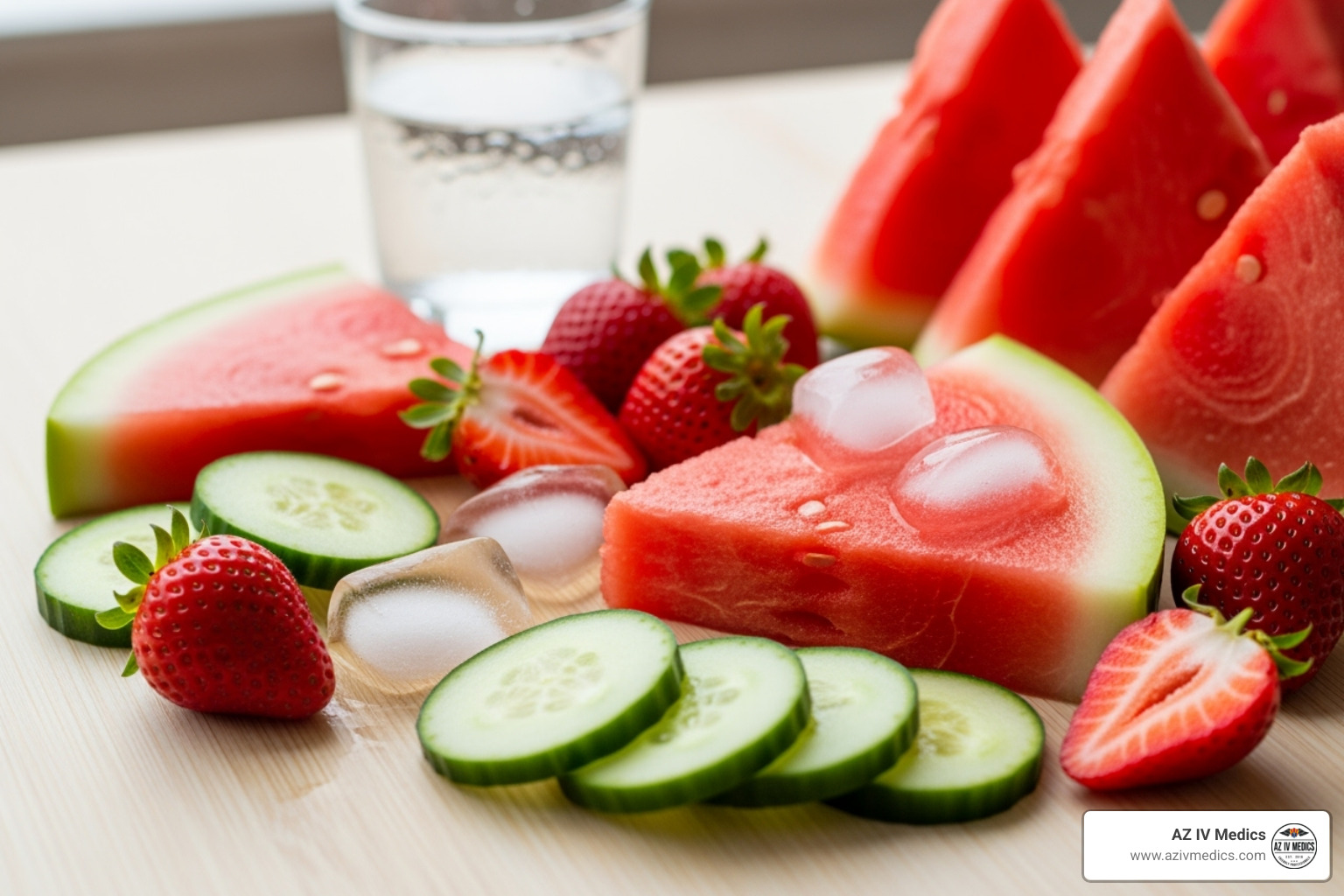
How to Drink Water to Hydrate Based on Your Lifestyle
Your lifestyle, environment, and health status significantly impact your water needs. Here's how different situations might change your hydration strategy:
- Exercise and Activity Levels: If you're physically active, you'll need more water to replace lost fluids. We recommend drinking 16 to 20 ounces of fluids one to two hours before an activity, six to 12 ounces every 10 to 15 minutes during it, and another 16 to 24 ounces after to rehydrate.
- Hot Climates: Living in Arizona, we know about heat. During our intense summers, your body loses more fluid through sweat. We suggest drinking 5 to 7 ounces of fluids every 15 to 20 minutes when outside. For more tips, check out "The Importance of Hydration in Arizona's Climate."
- High Altitude: In high-altitude areas like Flagstaff, you need increased fluid intake because the drier air and increased breathing rates lead to more fluid loss.
- Illness: Conditions like fever, vomiting, or diarrhea cause rapid fluid loss, so you'll need to proactively drink more water.
- Pregnancy and Breastfeeding: Pregnant and breastfeeding women have increased fluid requirements to support themselves and their baby.
- Diet: A diet high in salty, spicy, or sugary foods can increase your need for water.
Understanding these factors is key to knowing how to drink water to hydrate optimally for your unique circumstances.
Are You Dehydrated? Key Signs to Watch For
Your body sends signals when it's dehydrated, but feeling thirsty is often a late warning sign. It’s wise to look for other indicators.
One of the simplest ways to gauge your hydration is to check your urine color. If you're well-hydrated, it should be light yellow, like pale lemonade . Darker urine is a clear sign you need more water. As research confirms, urine color is also a common indicator of hydration status.
Other common signs of dehydration include:
- Fatigue and low energy
- Dizziness or light-headedness
- Dry mouth and lips
- Headaches
- Muscle cramps
- Infrequent urination
- Dry skin
- Irritability or confusion
Recognizing the early signs of dehydration: what you need to know is crucial for preventing more serious health issues, especially here in Arizona.
The Smartest Ways to Drink Water to Hydrate Effectively
Now let's cover practical strategies for how to drink water to hydrate effectively. It’s about consistent, mindful sipping, not chugging.
Sipping water throughout the day is more effective for hydration than drinking large amounts at once. When you drink too much too quickly, your body often excretes the excess without optimal absorption. Consistency is key.
Start your day by drinking a full glass (16-20 ounces) of water when you wake up. This kickstarts your metabolism and rehydrates your body after a night without fluids.
Make it a habit to drink a glass of water with each meal and between meals . This aids digestion and helps you build hydration into your daily routine.
Using a reusable water bottle is one of the most effective tips. Carry it with you to make sipping convenient. If plain water is boring, add a slice of lemon, berries, or cucumber for flavor.
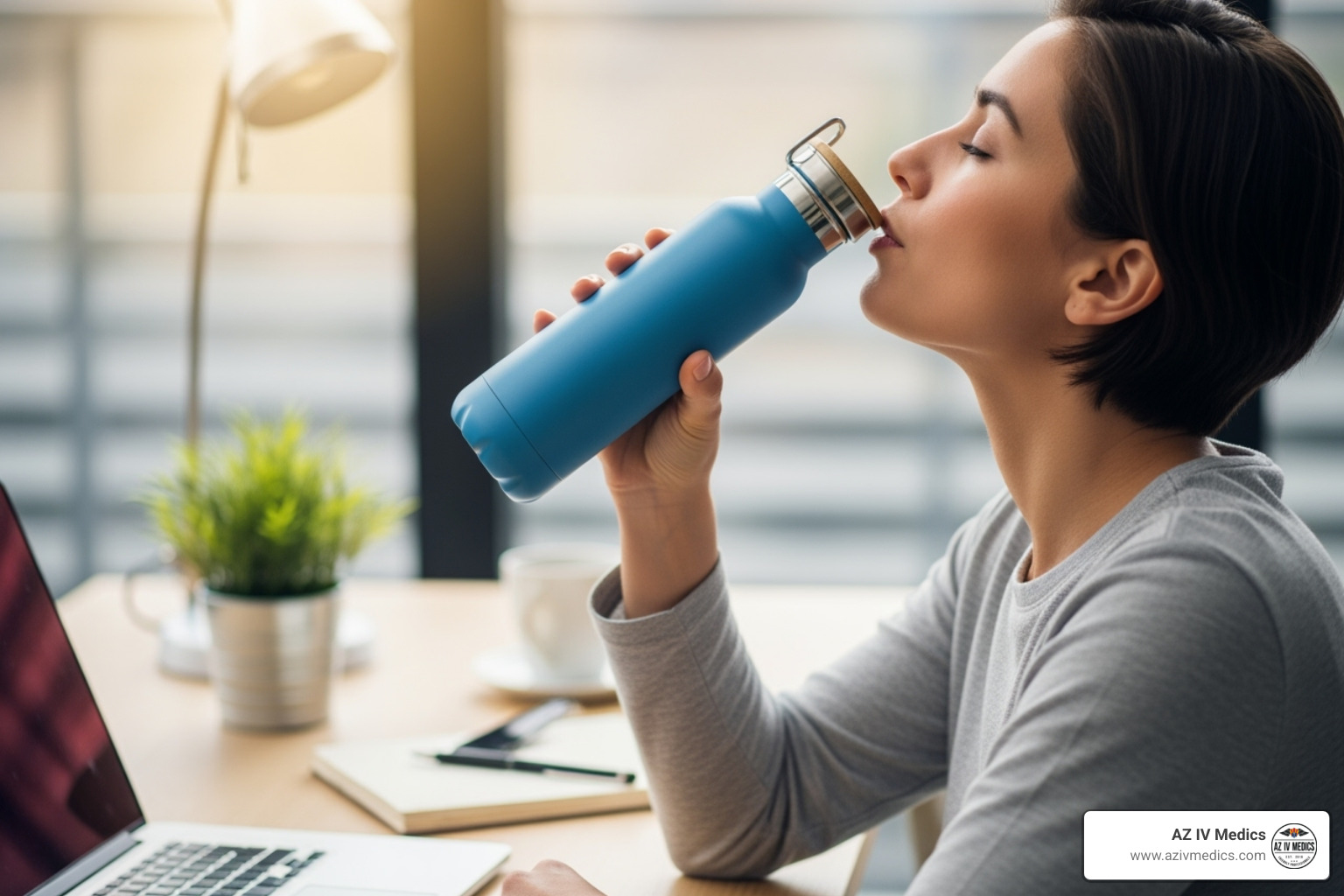
If you forget to drink, set alarms on your phone or use a hydration app to send you regular reminders.
Beyond the Tap: Other Sources of Hydration
Plain water isn't the only way to hydrate. About 20% of your daily fluid intake comes from food, and many beverages also contribute.
Here are some excellent hydrating options:
- Fruits and Vegetables: Many are packed with water, vitamins, and minerals. Top choices include watermelon (92% water), strawberries (91% water), cucumbers (95% water), celery , and oranges (86% water).
- Other Beverages: Herbal teas , broths , and smoothies are also great sources of fluid. Broths are particularly good for rehydration as they often contain electrolytes.
What to Limit for Optimal Hydration
Some beverages can work against your hydration goals. For optimal hydration, we recommend limiting or avoiding the following:
- Sugary sodas and energy drinks: These are loaded with sugar and can contribute to dehydration.
- Alcohol: As a diuretic, alcohol increases urine production and can lead to fluid loss.
- Excessive caffeine: While moderate coffee intake (1-2 cups) contributes to your fluid intake, high doses (over 250-300 mg) can have a dehydrating effect. We recommend limiting caffeinated drinks to about 3 cups per day.
- High-sugar fruit juices: These often lack the fiber of whole fruit. It's better to eat the whole fruit for hydration and nutrients.
The goal is to make water your beverage of choice, freeing up space for fluids that truly nourish your body.
When Drinking Water Isn't Enough
While mastering how to drink water to hydrate covers most situations, there are times when your strategy needs to shift. Sometimes plain water isn't enough, and in rare cases, you can even drink too much.
Can You Drink Too Much Water? The Risks of Overhydration
Yes, you can drink too much water. Overhydration , or water intoxication , is a real and dangerous condition. When you drink massive amounts of water too quickly, your kidneys can't keep up, and your blood sodium levels can drop dangerously low. This condition is called hyponatremia .
Healthy adults are rarely at risk, but endurance athletes are more vulnerable because they may drink excessive water during long events without replacing electrolytes lost through sweat. People with certain kidney, heart, or liver conditions also need to be careful.
Overhydration symptoms include nausea, vomiting, headaches, and confusion. In severe cases, it can lead to seizures or a coma. The key is balance; don't force yourself to chug excessive amounts of water.
How to Drink Water to Hydrate After Severe Fluid Loss
Sometimes, your body loses fluids faster than you can replace them through drinking. This can happen with vomiting and diarrhea , heat exhaustion (especially in Arizona), or intense, prolonged exercise .
During severe dehydration, your body loses not just water but also essential minerals (electrolytes) like sodium and potassium. This is why drinking plain water when you're very dehydrated can sometimes make you feel worse.
Oral rehydration solutions are your best friend in these situations. These drinks contain a balance of water, salts, and sugars that help your body absorb fluids more efficiently than plain water. You can buy them or make a simple version at home.
However, if you're experiencing extreme dizziness, confusion, can't keep fluids down, or show signs of heat-related illness, it's time for professional help. Knowing how to rehydrate after vomiting is crucial.
This is where professional hydration support like IV therapy makes a difference. It delivers fluids and electrolytes directly into your bloodstream for rapid rehydration. For rapid recovery from dehydration, mobile IV therapy services can help you bounce back quickly.
Conclusion
Mastering how to drink water to hydrate is a game-changer for your daily performance. As we've covered, optimal hydration goes beyond the "eight glasses a day" rule and requires a personalized approach for your lifestyle and environment.
Remember these key takeaways:
- Personalized hydration is key: What works for a marathon runner is different from what an office worker needs.
- Listen to your body's signals: Use indicators like urine color to gauge your hydration status.
- Sip throughout the day: Consistent, steady intake is more effective than chugging.
- Eat hydrating foods: Watermelon, cucumbers, and other produce contribute to your fluid intake.
Living in Arizona's desert climate means hydration requires extra attention. The scorching summers and dry air can quickly deplete your fluid levels.
Sometimes, despite your best efforts, life throws curveballs like a stomach bug or overexposure to the sun. For situations where oral hydration isn't fast or effective enough, professional services can help restore balance quickly.
Mobile IV therapy services, for example, bring expert hydration directly to your door, with no waiting rooms or travel fees, so you can feel better, faster.
Your hydration journey is yours, but you don't have to go it alone. Whether you're sipping your way to better health or need an extra boost, professional help is available.
Frequently Asked Questions about Hydration
We get many questions about hydration from our clients across Arizona. Here are answers to some of the most common ones to help you master how to drink water to hydrate.
How long does it take to rehydrate?
A common question is how long it takes to rehydrate. Your body is quite efficient; absorption starts within about 5 minutes of drinking. However, peak absorption takes 15 to 60 minutes , depending on how dehydrated you are and what you're drinking. Mild dehydration can be resolved quickly, but severe cases can take several hours to fully restore fluid balance. This is why IV therapy provides such rapid relief, as it bypasses the digestive system.
Does coffee dehydrate you?
The myth that coffee is dehydrating is common, but your morning cup isn't the villain it's been made out to be. While caffeine is a mild diuretic , the dehydrating effect only kicks in at high doses—over 250-300mg , which is about two to three 8-ounce cups of coffee. Moderate coffee intake actually contributes to your daily fluid intake. Just remember that water is still your best choice for primary hydration.
Is it better to drink water cold or at room temperature?
When it comes to water temperature, both have their merits, but it often comes down to personal preference.
- Cold water may absorb slightly faster and can be more refreshing, especially during exercise or in Arizona's heat, which might encourage you to drink more.
- Room temperature water is considered by some to be gentler on the digestive system.
The bottom line: personal preference is most important . The best temperature is whatever encourages you to drink water consistently throughout the day. Don't get caught up in the details and miss the bigger picture of staying hydrated.



